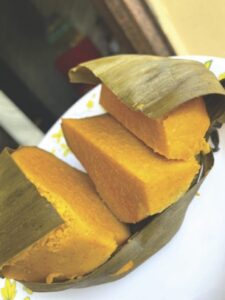From Jude Chinedu, Enugu
At dawn in Enugu, as the mist slowly lifts over the city’s rolling hills, the aroma of freshly cooked okpa drifts through markets, bus parks and roadside stalls. Wrapped in nylons or banana leaves, still steaming, the orange-hued pudding is not just a meal; it is a cultural signature, a unifier of people across classes, ages and professions.

Okpa, also called Ọkpa di oku, is a steamed pudding made from bambara groundnut flour. Its preparation is deceptively simple: palm oil, pepper, salt and sometimes uziza. Yet the result is magical. Soft, fragrant and deeply satisfying, okpa is often eaten for breakfast or as a midday snack. For farmers heading to the fields, artisans on their way to the workshop, traders in the market or students rushing for morning lectures, okpa has long been the reliable companion.

“It is a food that calls everyone,” says Mama Ifeoma, a vendor at Ogbete Market in Enugu. “Okpa says, come and eat me. Whether you are rich or poor, young or old, there is no one who cannot eat okpa.”
Indeed, unlike many traditional meals that bear the weight of class stereotypes, “village food” for some, “elite food” for others, okpa is one of the few that transcends those divides. It is as common on the streets of Abakpa market as it is in the lounges of government offices. At workshops and conferences in Enugu, okpa is often proudly served alongside tea, bread or pap.
“No matter where I travel, once I return to Nsukka, the first thing I look for is okpa,” confesses Dr. Chinedu Okorie, a lecturer at the University of Nigeria, Nsukka. “It is not just food; it is part of our identity.”
This universality has made okpa more than sustenance. It is a cultural ambassador, one that has carried Nsukka and Enugu’s food heritage across Nigeria and now into the diaspora.
But for one young woman, okpa has been more than heritage or breakfast. It has been a passion, a business, a means of survival and a stage to project her culture to the world.
At 24 years old, Macroven Mmasinachi, a zoology graduate of the University of Nigeria, Nsukka (UNN), has carved a name for herself as Mma Nwanyi Okpa Nsukka, the young woman who dared to rebrand a delicacy many considered the preserve of roadside vendors and elderly women.
“I sell okpa,” she says simply, before pausing with pride. “I started selling okpa when I was in second year. That was in 2020. I started this business out of love for okpa. To me okpa is not just food. It is an embodiment of heritage and culture. I wanted to project Nsukka to the world.”
Her decision was unconventional. In university, young women were more likely to sell clothes, bags or hair products to support themselves. Cooking and hawking okpa seemed old-fashioned.
“Ordinarily, people that sell okpa are old women and village people. Me being a young girl in the university, I thought of something unique to do, something I can be doing to help myself in school.
“Okpa was what came to my mind out of everything I thought of. First, okpa was my best food while growing up. I also felt that it was something I could do and people will see Nsukka better. I did not just want it to be just food. I wanted it to be like culture packaged to you.”
And so she began, buying flour, learning recipes, and wrapping her first batches in banana leaves. It was not easy.
“When I started okpa in my second year, people started discouraging me. They were like what is a beautiful girl like you doing cooking and selling okpa? You can sell clothes, why are you not selling bags? Of all the things to sell, why are you selling okpa?”
“I don’t like doing what others are doing. I love doing what I like and what works for me. I had my down moments for two years because of so many issues of life. I got scammed.” Yet, she persevered.
Mmasinachi did not stop at cooking and selling. She saw possibilities others had missed.
“I don’t just sell cooked okpa. I invented pre-mixed okpa flour. Pre-mixed okpa flour is ready to cook. You buy and cook. Everything is there already. Just add water and you are good to go.”
From this idea, her small business took on global wings. “I export both pre-mixed okpa flour and plain okpa flour to the UK, US, Canada and Netherlands.”
For many diaspora Nigerians, this was a revelation, a way to bring home into their kitchens thousands of miles away.
Listening to Mmasinachi describe okpa is like hearing a poet speak of love.
“Okpa is an Nsukka food. Okpa doesn’t need seasoning. It doesn’t need crayfish. It doesn’t need all these things we see here. Okpa is a big chick on its own. She needs only a few things. I say she because okpa is beautiful. She is a mother. Okpa needs just palm oil, pepper, uziza and salt. That is it.
“There is something welcoming about okpa that even I cannot tell. Okpa is ozo Igbo ndu. Both the rich and the poor can afford it. Okpa is that food that everybody can eat. The aroma alone is very welcoming. It is healthy. Okpa accepts everybody.”
She explains the preparation. “To make okpa, you scoop in the flour in a bowl, then you add your palm oil. You mix it thoroughly till everything marries each other. Then you add your hot water in the okpa. Then you turn it. You now turn it gradually.
“You do it as though you are kneading flour. It takes a little time. You just keep adding water bit by bit. Then when the paste is slightly thick, you keep turning it, you don’t stop. The reason is to give it this fluffiness when it is ready.
“Once it now gives you that paste-like feel, you add your salt, uziza and pepper. You then add water. The consistency should be between thick and watery. It should be slightly watery. If it is thick, the okpa will be very strong when it is ready.
“Then you put it in nylon or banana leaves. Some people put the okpa in a nylon and then put it inside banana leaves. That doesn’t make any sense. If you want to get the banana leaf flavour, put it straight into the banana leaves.
“Then put it inside the pot of boiling water. If you are cooking okpa, once you open your pot, don’t close it until you are done. Then cover your pot. Then allow your okpa to cook for 45 minutes and you are done.”
For her, cooking okpa is never rushed. It is about memory, patience, and love.
“I love to eat something nice so I make it as though I am making it for myself. To me, okpa is home. So if I am giving you my okpa, I am giving you that full flavour of Nsukka. You feel at home, you remember your grandmother’s food. That is how I make my own okpa.”
Okpa is not just a favourite in Nsukka; it has spread across Enugu and Igboland, becoming a signature delicacy.
At bus stops, it is sold in neat wraps to travellers. In homes, it is served with pap, bread or soft drinks. At offices, civil servants nibble on it between meetings. At conferences, it is proudly displayed as part of Enugu’s heritage.
For many, it embodies a rare balance – affordable enough for a farmer, yet esteemed enough for a commissioner.
As Mrs Amaka Eze, a civil servant, puts it: “Okpa does not discriminate. Whether you are a trader at Abakpa market or a commissioner at Government House, once you taste a well-prepared okpa, you will love it.”
This broad appeal rests on three strengths: affordability, nutrition, and cultural pride. Bambara groundnut is rich in protein, making okpa filling and sustaining. Its ingredients are few and accessible, ensuring it remains within reach of all classes. And its roots in Nsukka tradition make it a source of pride.
With entrepreneurs like Mmasinachi exporting pre-mixed flour, okpa has crossed borders. In diaspora communities, especially in the UK, US and Canada, it has become a way of reconnecting with home. Nigerians abroad now steam okpa in their kitchens, savouring its aroma and taste as a reminder of their roots.
Food researchers have also begun to spotlight bambara groundnut, the key ingredient, as a climate-smart crop — drought-tolerant, nutritious, and underutilised. Increased demand for okpa may, in the long run, benefit farmers and processors across Nigeria.
For Mmasinachi, her journey with okpa is far from over. What began as a way to support herself in university has become a business, a cultural mission and a personal calling.
In the bustling stalls of Enugu and the kitchens of London, in the hands of street vendors and at the tables of commissioners, okpa continues to do what few foods can — unite, nourish, and remind people of who they are. Okpa is more than food. It is Enugu’s gift to the world.
The post Okpa: Enugu’s heritage delicacy that defies class, wins universal love appeared first on The Sun Nigeria.





